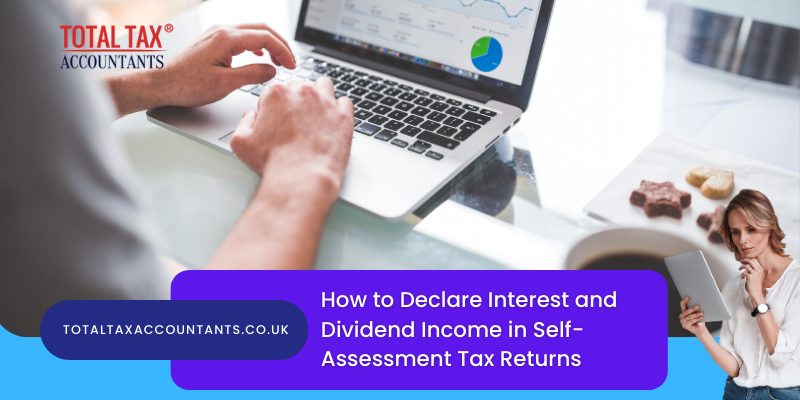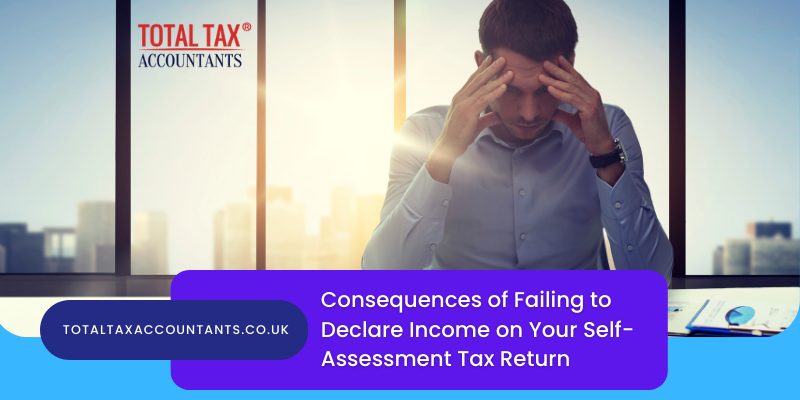The Self-Assessment tax return is a system used by HM Revenue and Customs (HMRC) to collect Income Tax. It’s primarily used by individuals who are self-employed, have complex income sources, or earn over a certain threshold. If you receive income from interest or dividends, you are required to declare this on your self-assessment tax return.

The Importance of Declaring Interest and Dividend Income
Interest and dividend income, like all types of income, is subject to tax and must be reported in your tax return. Interest income refers to money earned from savings accounts, bonds, or loans you’ve made. Dividend income refers to the portion of a company’s profits distributed to shareholders. If you’ve received any such income, it’s essential to include this in your self-assessment tax return to ensure you’re meeting your legal obligations and paying the correct amount of tax.
How to Declare Interest Income?
To declare your interest income, you need to fill in the section labeled ‘UK interest etc.’ on your self-assessment form. Here, you’ll provide details about the amount of interest you’ve earned in the tax year. If you received interest from UK banks or building societies, you would include this information in the ‘Interest and dividends from UK banks and building societies’ subsection.
Remember to account for all sources of interest income, such as those from peer-to-peer lending or corporate bonds. If tax was already deducted from your interest income before you received it, make sure to include this detail as well.
Reporting Dividend Income
Dividend income should be reported in the ‘Dividends’ section of your self-assessment tax return. You’ll need to specify the total dividends you received from UK companies, specifying the amount that falls into the basic rate band and the amount that exceeds it.
If you own shares in a foreign company and receive dividends from them, these should also be included. There’s a separate section for ‘Foreign income and gains,’ where you should report these details.
What to Do if You’ve Received Tax-Free Interest or Dividends
Not all interest or dividend income is taxable. If you’ve received any tax-free or tax-exempt interest or dividends, such as those from ISAs (Individual Savings Accounts) or certain government or corporate bonds, these don’t need to be included in your self-assessment tax return. However, it’s good practice to keep records of these, in case HMRC queries your return.
Final Thoughts
Declaring interest and dividend income on a self-assessment tax return might seem complicated, but it’s a crucial part of ensuring you’re paying the correct amount of tax. It’s always a good idea to keep detailed records of your income and consult with a tax professional if you’re unsure about any aspect of the process. Remember, the goal is to provide a complete and accurate picture of your financial situation to HMRC, thereby avoiding any potential penalties for underpayment of tax.
Which HMRC forms are Used to Declare Interest and Dividend Income in Self-Assessment Tax Returns
When it comes to declaring income for tax purposes, HMRC has designed a series of forms that guide individuals through the process. These forms are part of the Self-Assessment tax return system and are particularly relevant for those who have received interest or dividend income. This article will focus on the forms required for declaring these types of income.
Form SA100: The Core of Your Self-Assessment Tax Return
The primary form that everyone completing a Self-Assessment tax return must fill out is Form SA100. This form covers the basics of your income and is where you’ll summarize your total income from various sources, including your salary, pension, and benefits. However, to declare interest and dividend income, additional supplementary pages are required.
Form SA101: Declaring Additional Income
If you have additional income that isn’t covered by the main SA100 form, you’ll need to complete Form SA101. This includes interest and dividend income.
In the section labeled ‘UK interest etc.’ (Box 1), you’ll declare the total taxable interest from UK banks and building societies. This includes income from any savings accounts or other interest-bearing accounts you hold. If you’ve received interest with tax already taken off, you’ll declare this in Box 2.
Form SA102: Declaring Dividend Income
For dividend income, you’ll complete Form SA102. This form is specifically for dividends and other income from shares.
You’ll list the total dividends from UK companies in Box 1. Remember, this should only be the taxable amount. In Box 2, you’ll declare the amount of tax credit associated with the dividends you’ve received.
Form SA106: Declaring Foreign Income and Gains
If you’ve received interest or dividends from sources outside the UK, you’ll need to complete Form SA106. This is for declaring foreign income and gains.
In the ‘Foreign dividends’ section, you’ll declare any foreign dividends in Box 17, and any associated foreign tax paid in Box 18. For foreign interest, this would be declared in Box 3 of the ‘Other foreign income’ section, with any foreign tax paid on this income declared in Box 4.
Form SA107: For Interest from Gilts and Securities
For those who have received interest from UK government securities (gilts) or corporate bonds, Form SA107 is required. This form is specifically designed for those with income from shares and securities.
The ‘Interest and other distributions from UK companies not on voucher’ section is where you’ll declare this income. The amount of interest received goes in Box 1, while any tax taken off this income is declared in Box 2.
The Importance of Accurate Completion
Filling out these forms accurately is crucial for ensuring you pay the correct amount of tax and avoid potential penalties. If you’re unsure about any aspect of these forms, it’s always a good idea to seek advice from a tax professional. Remember, the HMRC website provides comprehensive guidance and you can contact HMRC directly if you have any queries. The key is to keep detailed records of all your income, including interest and dividends so that when it comes time to complete your Self-Assessment tax return, you have all the information you need at your fingertips.

Consequences of Failing to Declare Income on Your Self-Assessment Tax Return
Failing to declare all forms of income, including interest and dividend income, on your Self-Assessment tax return in the UK can lead to serious consequences. HM Revenue and Customs (HMRC) expects full disclosure of all taxable income, and failure to comply can result in penalties, interest charges, and in severe cases, criminal prosecution.
Penalties for Filing Inaccurate Returns
If HMRC determines that your tax return is inaccurate and you’ve underpaid your tax as a result, they can impose penalties. The size of the penalty largely depends on why you underpaid your tax.
- If HMRC believes that you were careless or made an error, the penalty can be between 0% and 30% of the extra tax due.
- If HMRC believes that you deliberately underpaid your tax, the penalty can be between 20% and 70% of the extra tax due.
- If HMRC believes that you deliberately underpaid your tax and attempted to hide it, the penalty can be between 30% and 100% of the extra tax due.
Interest Charges on Unpaid Tax
In addition to penalties, HMRC will charge interest on unpaid taxes. This includes tax that you failed to pay because you did not declare all your income. The interest is calculated from the date the tax was due until the date it’s paid. The interest rate varies and is determined by HMRC.
Investigation by HMRC
Failing to declare income could lead to an investigation by HMRC. This can be a stressful and lengthy process during which you’ll need to provide evidence for your financial transactions and accounts. If HMRC concludes that you’ve been dishonest, they can prosecute you. This is rare and typically reserved for the most severe cases of tax evasion.
Making Amends: The Importance of Disclosure
If you realize you’ve failed to declare interest or dividend income, it’s important to act immediately. You can make a voluntary disclosure to HMRC, which can help reduce any penalties you might face. The process involves telling HMRC that you have unpaid tax, providing them with accurate details, and making arrangements for payment.
In summary, it’s crucial to declare all forms of income, including interest and dividends, on your Self-Assessment tax return. If you’re unsure about anything, seek advice from a tax professional or contact HMRC. It’s better to ask for help than to risk getting penalized for inaccuracies or omissions.
How a Tax Accountant like “Total Tax Accountants” Can Help you in Self-Assessment Tax Returns?
Navigating the complex world of taxes can be daunting, especially when it comes to self-assessment tax returns. This is where Total Tax Accountants, a reputable firm based in High Wycombe, comes into play. With their expertise and personalized approach, they can help you manage your tax affairs efficiently and effectively.
Comprehensive Tax Services
Total Tax Accountants offer a wide range of tax-related services. They can assist you with self-assessment tax calculations, ensuring you avoid any potential issues and understand when and how to submit your return. Their services extend beyond self-assessment, including assistance with HMRC tax investigations, bookkeeping, payroll services, VAT returns, and more. They are a one-stop-shop for all your tax needs.
Personalized Approach
Recognizing that every individual and business is unique, Total Tax Accountants strive to understand each client’s specific needs. They provide a personalized approach to each client’s unique needs, ensuring they offer the most effective tax planning solutions. Their commitment to client success has led to organic growth through client referrals, a testament to their client satisfaction.
A Decade of Experience
With over a decade of experience serving the High Wycombe community, Total Tax Accountants have proven their reliability and expertise in the field of taxation. They have a track record of solving complex issues, making them one of the leading consultancy service providers in High Wycombe. Their services are certified by banks and the Home Office, further cementing their credibility.
Customer Satisfaction
Total Tax Accountants pride themselves on their excellent customer service. They are known for their efficient and friendly service, with reasonable prices. They are always ready to answer any questions or concerns their clients might have regarding finance. This is reflected in the numerous positive reviews they have received from their clients on various platforms.
Conclusion
Whether you’re an individual needing help with your self-assessment tax return or a business owner looking for comprehensive tax services, Total Tax Accountants can provide the expertise and personalized service you need. Their commitment to client success, combined with their wide range of services and a decade of experience, makes them a reliable choice for all your tax needs.


